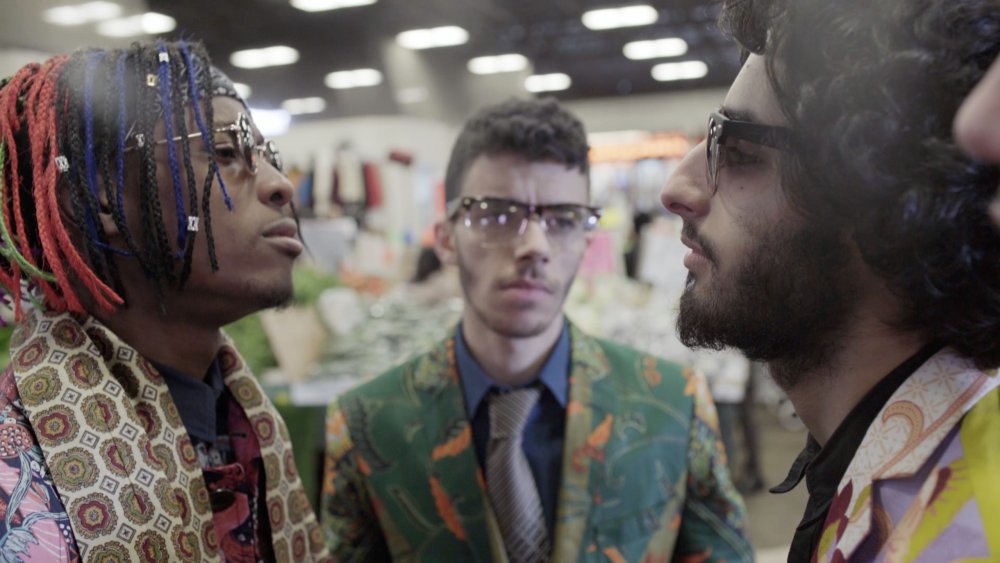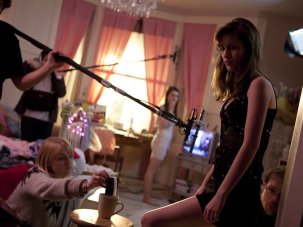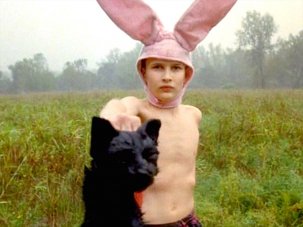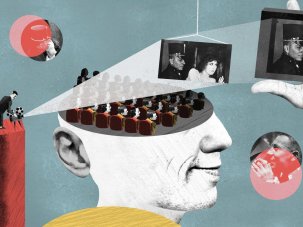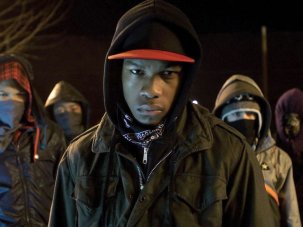The new generation of young filmmakers is the first to create from the standpoint of true digital natives. They are launching their early-career shorts at a time when individualised, streamed, screen-based work is gaining precedence over traditional cinema premieres; when ‘users’ access ‘content’ whenever they feel like it, from whatever era they choose, with news, entertainment, work stuff and communication often delivered via the same device; when online buzz amongst networked followers is more important than landing a big Sunday interview in a broadsheet; and when even great cinematic directors flow between features, prestigious novel-like TV series for sites Netflix, Amazon and Hulu, adverts, fine art and music videos.
Playback in association with Random Acts runs 21-25 March 2018 at the ICA, London as the conclusion of a year-long UK tour. Bidisha chairs the panel discussion Making It, Millennial Creatives and the Digital Revolution on 24 March. The Random Acts and First Acts videos are collected here.
Creative barriers might be dissolving in this new digital age, where equipment is cheaper than ever and ‘releasing’ a film involves putting it on Vimeo Pro. At the same time, however, funding for the arts sector is increasingly limited, social mobility has stalled, the gig economy has turned everyone into exhausted freelancers and it’s harder than ever to forge a long-term career. The talent’s there – but will the wider industry, culture and society be fit to support it?
To support the new generation of British film talent, Channel 4 launched its Random Acts strand showcasing late night short films, while its First Acts project mentors and develops work specifically by 16-to-24-year-olds. A supporting project hosted by the ICA in London promotes the work through Playback, a multi-day festival coupled with a UK-wide tour which screens the films for live audiences.
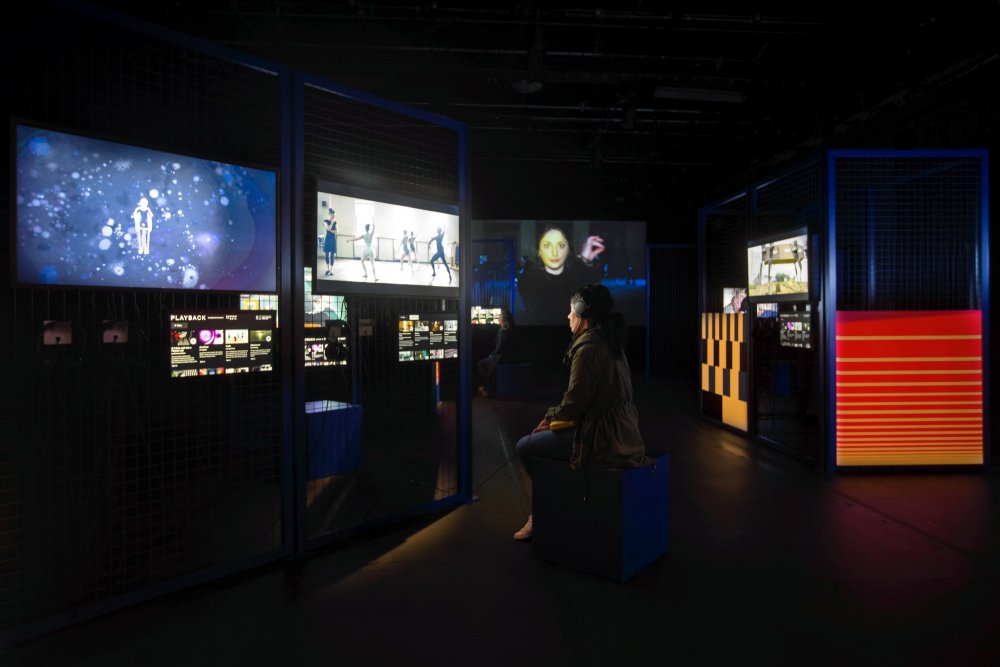
Playback installed at the ICA, London
Credit: George Torode
Asked to chair a debate at Playback called Making It: Millennial Creatives and the Digital Revolution, I immersed myself in the work of this year’s First Acts directors. What I found was an amazing and very high-quality mix of creativity, political consciousness, style and an easy amalgamation of music, fine art aesthetics, performance art daring and fashion swag, coupled with mature direction of actors and excellent technical skills in terms of editing, sound and shooting. The First Acts directors I spoke to come from a range of professional and academic backgrounds including fine art, anthropology, fashion and dance; and, contrary to the prevailing image of the arrogant, sloppy millennial, every individual I approached was professional, respectful and articulate.
Jessica Bishopp’s film Lifespan is an exquisite study of a retirement community of bungalows, captured in a gorgeously soft, angelic light which gently picks out neighbourhood pets, lace curtains, flower beds and ornaments. It’s a powerfully tender, humane and generous film with thoughtful voiceovers commenting on how an increasingly long-lived society must become “more collective and co-operative”.
When I ask Bishopp if she’s more interested in being seen online than in traditional cinemas she notes that she received commissions from Film London and (like several of the filmmakers profiled here) Stop Play Record after she put a documentary of hers online, when “certain [traditional] environments within the industry wouldn’t have taken me seriously. Young women filmmakers can be a part of arts collectives like Gal-Dem and Girls on Film which help you promote new work. It’s a sisterhood, it’s grassroots.”
That said, most of the First Acts filmmakers I spoke to retained a love for the traditional cinema experience. Saskia Dixie’s film Capital of the C is an edgy, chic and impeccably well-controlled work, a glorious fashiony music video that fuses contemporary dance and immaculate styling with swooping, sleek camera arcs and a sharp palette of crimson, grey and white.
Dixie bemoans the way “you can get lost online and find yourself flicking through things. Culture and social media are so saturated it’s just getting out of control. Maybe it’ll collapse into itself. Longevity is scuppered these days; sometimes I feel I consume on such a surface level, there’s a constant feeling of trying to flick through and catch up. Hopefully there’ll be a rebellion and people will fight to stay connected to one another instead of being attached to these singular devices. There’s something romantic and special about putting your phone away to experience something more immersive, with an amazing sound system and a size of screen that’s going to draw you in.”
First Acts director Robyn Wilton appreciates a “cross-media platform”, saying that Playback gave her the opportunity to be broadcast on Channel 4, screened in cinemas and shown in galleries as well as online. “I guess that’s our generation, wanting it all, isn’t it?” she jokes.
Her film All the Busy Ings is a stunningly unique, artistic piece that builds into something Björk may well covet for her next video project. It is made with absolute precision, dwelling lushly on oozing paint, a hole burning into paper, a spreading shadow, all intercut sharply with floral imagery. Wilton shows a mesmerising sensitivity to colour and texture, as well as a delicate way with audio, slipping in the sounds of breathing, a clock ticking and cello music.
Like many of the First Acts generation, she sees herself as an artist who works in film, rather than as a traditional, Spielberg-like director. “The barriers are very blurred. I could go into commercials and engage in lots of different projects across the board. What’s great at the moment is that small independent film are reaching bigger platforms, like Call My By Your Name, You Were Never Really Here and Lady Bird. More experimental work is becoming more accepted. It’s really comforting to know that your work won’t just be shared between friends and fellow artists.”
Despite the creative confidence of the directors I spoke to, all were painfully clear-eyed about the inequalities of sex, race and class within the London-dominated film industry. One of the most passionately engaged young directors I spoke to is Aliyah Hasinah, whose film Sentence features elegiac spoken work poetry – “Our sons checked in and out of our communities like British weather… black policemen get pulled over too…” – performed by radiant, subtle young performers and shot with light, mobile camera-work. Sentence celebrates a creative community of non-stereotypical young female and male characters with gorgeously sensitive, stylish direction and a clever use of music, the melody and beats thumping as if heard through the wall at a house party.
Hasinah urges young filmmakers to engage fully with the industry. “It’s important to have a seat at the table. It’s important to know as much about your craft as possible. If you don’t know how the industry currently works there’s no way to change it. I like it when people shoot on iPhones and get creative with resources, but they have to boost the industry, especially people of colour. We need to be working and rising through the ranks together, not just stagnating.” She is dedicated to “raising awareness and making films about excluded histories or whitewashed histories. I’m not confident in the current system to fairly distribute money but I’m aware that there is money out there – and young people need to take advantage of that to take their coins!”
For all their talent and drive, and the opportunities afforded by enterprises like Random Acts and Playback, nearly all the directors I spoke to are still living at home, juggling multiple other jobs, obligations and studies. As Hasinah says, “You need several jobs just to make ends meet, but that very much leads to burnout – you only have time for your arts practice during the early hours. Constant internships that are unpaid aren’t helping.”
Issues of class, race and gender privilege and inequality come up in all my conversations with the First Acts interviewees. Alexander Rowland’s film For Alma is a tribute to the Alma housing estate in Ponders End, which is earmarked for demolition pending a multi-million pound redevelopment. Raw and elegiac, it features a local football team practicing at night, with the sounds of the city around them and a voiceover ruminating, “In this life I’m living, who knows when I’ll be gone?”
Rowland tells me the film industry can feel “quite exclusive. The thing I find really hard is walking into a room full of [privileged] guys who would never give me the time of day usually. The way they talk about grime, or a council estate location, I find it offensive. You can tell the clear class divide from the kinds of jokes they make. Discussion of gender diversity is growing in the arts, as is the representation of queer identities, but it’s still very white and middle-class. It’s just quite telling that class isn’t regarded at all, and we see a one-sided [stereotyped] view of class on film.”
All the filmmakers are painfully aware that despite the quality of their work, the actual opportunities for progression are limited. Director Thibaut Nyemba’s First Acts film Sapeur Showdown is a gloriously funny, stylish, raw and knowing send-up of urban gang stereotypes, in which two rival groups of insanely well-tailored young men have a vogueing, dancing, preening fashion-off in the middle of a fruit and veg market, kicking off their conflict with the incendiary words: “Word around town is that you guys got the best fashion.”
Nyemba counsels that a survival strategy for new directors is “knowing what your worth is and trying to get paid for it”, although “living in an expensive city like London, coming from a working class background, with sky rocketing rents, doesn’t help. You can have the greatest idea in the world but if you’re not connected with the right people it can be hard; the only way I can go about is making as many connections as I can in this ‘who-you-know’ business.”
He points out that “being a black filmmaker, I don’t see a lot of directors I can relate to. I often look to the States for inspiration. Although America still has its issues, you’re more likely to see someone of colour making big movies. Idris Elba had to go to the States to be appreciated by the UK. So did a lot of black actors. I don’t know if this trend will cross over to filmmakers. I hope not, as I strongly believe we breed not just the best actors but filmmakers too. Spike Lee once said the cheapest way to make a film is to write one. This inspired me to start writing as only I can tell the stories I want to film.”
Career development after the first burst of commissioned work isn’t guaranteed, particularly when so much is changing. First Acts director Dorothy Allen Pickard’s film The Wall is an accomplished, cleverly uneasy work filmed from inside a car going through a car wash, as a middle-aged man leaves a tender phone message for his daughter. I won’t give away what happens next, but this mature, nocturnally eerie narrative work, with its textural close-ups of droplets and condensation on the windscreen, has a disconcerting power.
Allen Pickard comments that, once The Wall had been screened at the BFI Future Film Festival earlier this year, “I felt a real sense of completion, like I had got what I wanted from the whole process. Watching it on the big screen with some of my closest friends and family sitting next to me was really significant, particularly because it’s such a personal film.” However, “as you develop as a director, your ideas start to involve more technically complex set ups, so you need more equipment and a bigger budget.”
She comments, “There are pros and cons to making it up as you go along. The pros are that you develop your own method and technique of directing, or storytelling, and this is particularly important for women and minority groups, who have been discouraged in one way or another from entering ‘the industry’. It’s really exciting that we can invent new ways of making films and working together, as there’s no longer pressure on following a conventional pathway.
“On the other hand, I know lots of people who haven’t pursued their work in film because there’s no clear way in, and there’s always the looming threat of a way out. Women directors disproportionately struggle to get a second feature funded, so it’s great that there are schemes for first features, but this really needs to continue throughout an artist’s working life.”
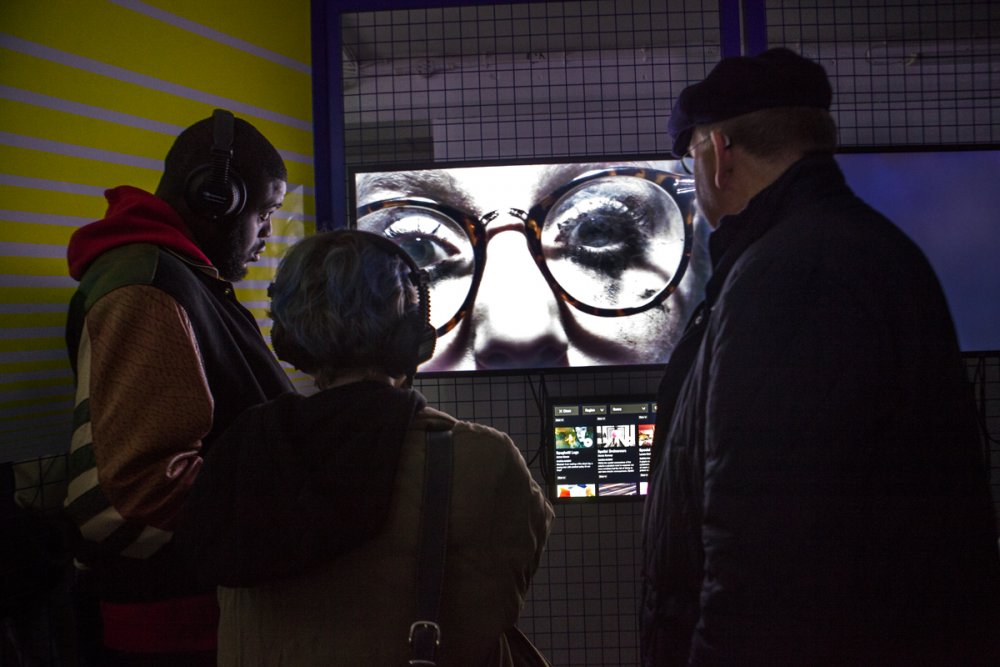
Playback installed at the ICA, London
Credit: Elzbieta Piekacz
All the directors I spoke to are doing what they love, whatever the cost in time or money or exhaustion. They are creating amazing work, but know they’re doing so in politically, economically and sociologically uneasy times. Jessica Bishopp is concerned about “where the industry is going with diversity and making sure everyone is represented not only in front of the camera but also behind it. I see a lot of films that have a very diverse visual aesthetic – but there are still the same people behind the camera.”
Aliyah Hasinah agrees: “In terms of representation, unless people are being held to account, and not just on Twitter, I don’t see us producing more than Downton Abbey. I do feel like issues of representation are infiltrating culture in a way – but through being very tokenistic, wanting BAME people but only for certain stories, stories of struggle. There’s so much more that communities of colour have to offer and always have done.”
Alexander Rowland concurs: “Even on an aesthetic level, beyond politics, people are just so bored of what they’re seeing – it’s either gritty crime dramas or Call the Midwife. Yet every time people do a campaign with people of colour that doesn’t fit expectations, it does really well. It’s a good time for change and if change happens now it’ll be a good time for people to receive it.”
-
The Digital Edition and Archive quick link
Log in here to your digital edition and archive subscription, take a look at the packages on offer and buy a subscription.




